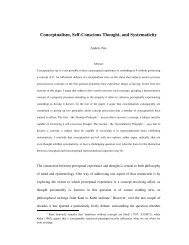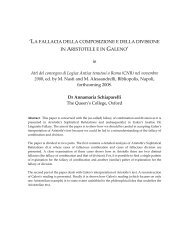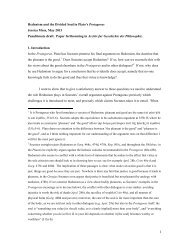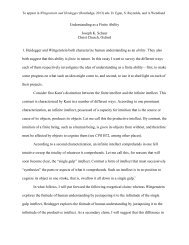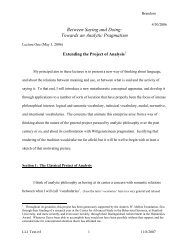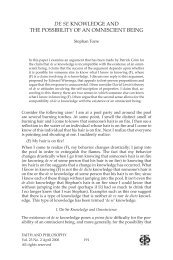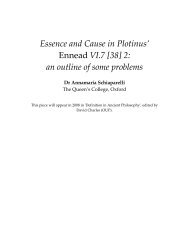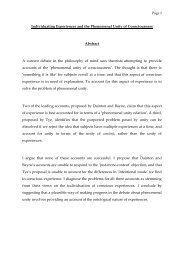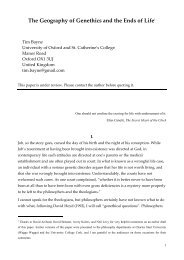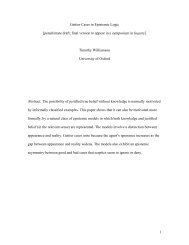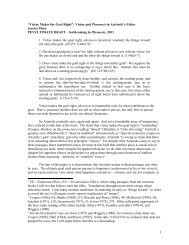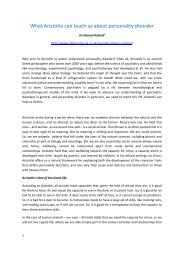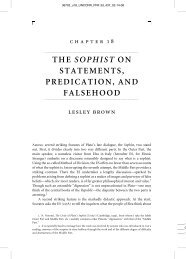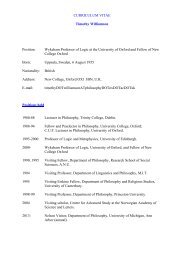Say who everyone is as you go along - Faculty of Philosophy ...
Say who everyone is as you go along - Faculty of Philosophy ...
Say who everyone is as you go along - Faculty of Philosophy ...
You also want an ePaper? Increase the reach of your titles
YUMPU automatically turns print PDFs into web optimized ePapers that Google loves.
44<br />
What <strong>is</strong> What <strong>is</strong>?<br />
If the world <strong>is</strong> an illusion, two questions are presupposed: Who <strong>is</strong> subject to the<br />
illusion? and What <strong>is</strong> reality?<br />
According to Nietzsche and Zen, no-one <strong>is</strong> subject to the illusion. Indeed, that<br />
there <strong>is</strong> anyone to be deceived <strong>is</strong> itself part <strong>of</strong> the illusion. If th<strong>is</strong> were the c<strong>as</strong>e, I<br />
think we would have to give up talking about ‘illusion’ here. Unless someone or<br />
something <strong>is</strong>, or could, be deceived it does not make any sense to talk about an<br />
illusion. In particular, ‘the self’ or ‘the subject’ cannot be an illusion. Otherw<strong>is</strong>e, <strong>who</strong><br />
or what would be subject to the illusion that there <strong>is</strong> a self or subject? If there <strong>is</strong> the<br />
putative illusion <strong>of</strong> the self or subject, there <strong>is</strong> a self or subject. Therefore, the Zen<br />
and Nietzschean doctrine that the world, including the self, <strong>is</strong> an illusion <strong>is</strong> self<br />
refuting. It <strong>is</strong> false. Indeed, it might well be an illusion.<br />
According to Nietzsche, there <strong>is</strong> no reality to contr<strong>as</strong>t with illusion. There <strong>is</strong> no<br />
such thing <strong>as</strong> the way what <strong>is</strong> really <strong>is</strong>, to contr<strong>as</strong>t with its illusory nature. On the Zen<br />
view, either a view like Nietzsche’s <strong>is</strong> right, or else there <strong>is</strong> the emptiness <strong>of</strong> Satori,<br />
which <strong>is</strong> beyond the duality <strong>of</strong> illusion and reality. Now, it does not make much<br />
sense to say that there <strong>is</strong> illusion or deception but no reality. If nothing <strong>is</strong> the c<strong>as</strong>e, it<br />
<strong>is</strong> impossible to be tricked into the false view that something <strong>is</strong> the c<strong>as</strong>e. It follows<br />
that Nietzsche’s view that there <strong>is</strong> no reality, only illusion, <strong>is</strong> false. Of course<br />
Nietzsche might still be right that the world <strong>as</strong> we ordinarily experience it <strong>is</strong><br />
presented to us in a perspectival way, and its appearance <strong>is</strong> constituted by power<br />
relations. Th<strong>is</strong> might be importantly right. However, perspectives are perspectives<br />
on, that <strong>is</strong>, they are perspectives on something rather than nothing. If there are no<br />
facts, only interpretations, something <strong>is</strong> interpreted. The question <strong>is</strong>; What?<br />
There <strong>is</strong> pr<strong>of</strong>ound insight in the Buddh<strong>is</strong>t view that it <strong>is</strong> possible to transcend the<br />
dualities <strong>of</strong> the empirical world. It <strong>is</strong> important to Zen that there should be meditative<br />
practice rather than the posing <strong>of</strong> metaphysical questions. Nevertheless, we might<br />
<strong>as</strong>k, What <strong>is</strong> Satori? Is Satori the d<strong>is</strong>closure <strong>of</strong> an ultimate metaphysical reality?<br />
Satori <strong>is</strong> beyond being and nothingness. Satori <strong>is</strong> beyond becoming. Becoming <strong>is</strong> the<br />
transition from being to nothingness or from nothingness to being. In Satori there <strong>is</strong><br />
the cessation <strong>of</strong> becoming and, therefore, the cessation from being to nothingness or<br />
nothingness to being. Nevertheless, I hesitate to call th<strong>is</strong> the transcendence <strong>of</strong> being<br />
and nothingness. I accept it <strong>is</strong> the transcendence <strong>of</strong> the empirical world, <strong>of</strong> th<strong>is</strong> being<br />
th<strong>is</strong> way, that being that way. It <strong>is</strong>, in my view, a synthes<strong>is</strong> <strong>of</strong> being and nothingness<br />
which I call no-thing-ness. No-thing-ness <strong>is</strong> a reality but not a physical or mental<br />
reality. Although, Zen practicioners will not engage in metaphysics, only practice, I<br />
maintain that no-thing-ness <strong>is</strong> a spiritual reality.



